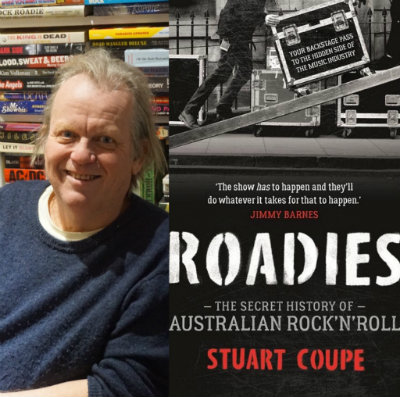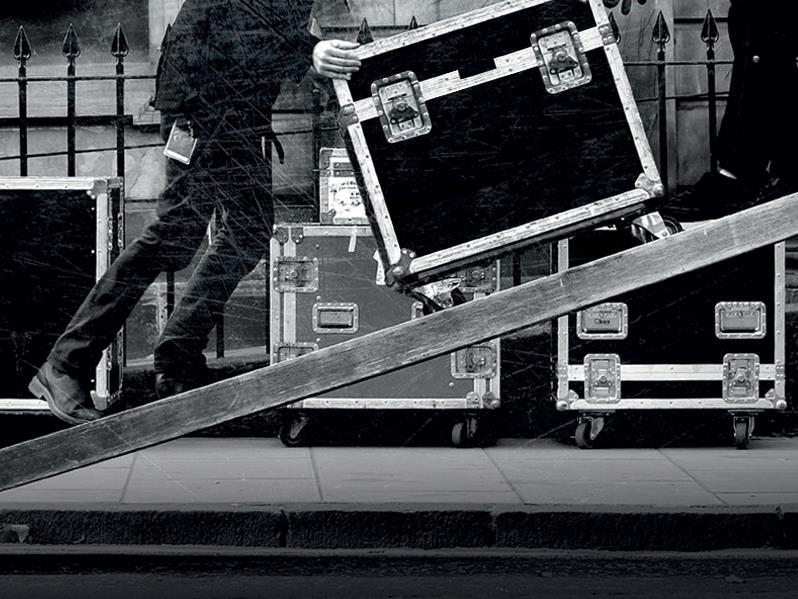Image: Cover art from Stuart Coupe’s Roadies – The Secret History of Australian Rock ‘n’ Roll.
About two years ago I decided I wanted to write a book about Australian road crew. Maybe not the most obvious of subjects for a book but one that I had decided was a very important story to tell.
OK, road crew are amazing, inventive, creative, hard-working larrikins with an astonishing skill set and raconteur skills to match. But there’s a dark side to their world. A very dark side. And that’s what really prompted my decision to tell the stories of Australian roadies.
The 2016 report, Working in the Australian Entertainment Industry: Final Report, noted ‘Suicide attempts were highest amongst technicians, crew and roadies, with 8.5% of respondents in this category reporting suicide attempts, compared to 3.2 % in the general population.’
This is an extremely alarming figure, and possibly even under-estimates the issue. And it’s situation particular to Australian road crew and, from my research, not one that is mirrored around the globe.
Over the years Australia has lost an extremely high number of working and former road crew to suicide; countless others suffer from crippling mental health issues.
Why have legions of Australian roadies been ending their own lives? There are some basic reasons. Physical incapacity. Poverty. Mental illness. Decreased demand. A changing work place. A lot of the older generation of road crew began working in the business in their late teens in a time when there were no wheels on road cases. No ramps to push gear up and down. There was no occupational health and safety, and no training. They spent 10 or 20 years pushing their bodies to breaking point.
And their bodies did break. Many former roadies suffer significant back and muscular-skeletal problems. They’ve had multiple surgeries, and body parts replaced. That’s if they can afford it. Others live with chronic pain.
Too many roadies have passed away simply neglecting their own physical and mental health, or because they lack the means to get proper medical attention.

Stuart Coupe (photo courtesy Susan Lynch) is the author of the new book, Roadies.
Sometimes the work just dried up. The artist a roadie has been committed to moves on, or a band breaks up. The Australian live music scene is not what it was in the 1960s, ‘70s, ‘80s and even into the ‘90s. There is less work, and more competition for it.
Until recently there was no superannuation for roadies. Some roadies were paid comparatively well for the work they did, others not so well. There is still no holiday pay. Beyond watching great rock’n’roll, and a lifestyle that many enjoyed, there were no other benefits. Except maybe a sense of purpose, and of family and belonging. But when it was all over, that can be lost too. For some, there is no one waiting at home, or no home at all.
Like the musicians they work for, roadies have a tendency to overuse alcohol, stimulants and other drugs. Often whatever they can get their hands on. Ultimately, though, using stimulants for short-term escapes or as pick-me-ups often masks deep-seated issues, which some roadies put off dealing with for years and years.
It’s an understatement but years on the road makes it hard to maintain long-term relationships. Find a former roadie who has a stable, longstanding relationship and you’ve found a roadie who is probably not in danger of self-harm. Sadly, there are many who don’t have stable relationships and family support.
Then there’s the issue of gaining other employment. Sure, there’s security work or corporate events for some, but for others doors are closed because they have no recognised qualifications.
‘Mate, I can get Guns N’ Roses around the country, onstage and not missing a gig – but apparently I’m not qualified to do anything,’ said one former roadie.
The tragic suicide of the much loved roadie Gerry Georgettis ten years ago galvanised the roadie community, and ultimately led to the formation of the Australian Road Crew Association (ARCA). The mantra of the organisation is that a roadie should call another roadie each week and check in on them, and this – along with financial assistance, in conjunction with the organisation Support Act – has dramatically reduced the suicide rate. Former roadies are learning that they’re not alone.
The closing section of my book Roadies contains three pages of names of Australian road crew who are no longer with us, a large percentage of them through suicides. A remarkably small number of Australian road crew have died on the road or at work.
I sincerely hope that my book helps to give a voice to Australian road crew, a sense of pride in their hard work and achievements. It’s a fact that the better a road crew are the more invisible they are. As concert and gig attendees we only see them if a kick drum falls over, an amplifier starts billowing smoke, or over excited fans decide to invade the stage. Otherwise they quietly get about their work of making musicians look and sound the best they possibly can.
For too long musicians have acknowledged their record label, managers, booking agents, partners. Now, in recent months I’ve seen the likes of Neil Finn and Paul Kelly publicly thank their roadies at the end of their concerts. Other artists may be doing it. All of them should be doing it.
Australian road crew are the backbone – and often the heart and soul – of this country’s music industry.
Support Act has a 24/7 Wellbeing Helpline: 1800 959 500. More information at supportact.org.au. General enquiries: 1300 731 303.
Roadies – the Secret History of Australian Rock’n’Roll by Stuart Coupe, published by Hachette Australia. Released on 25 September, RRP $32.99.
Lifeline Australia: www.lifeline.org.au or 13 11 14






